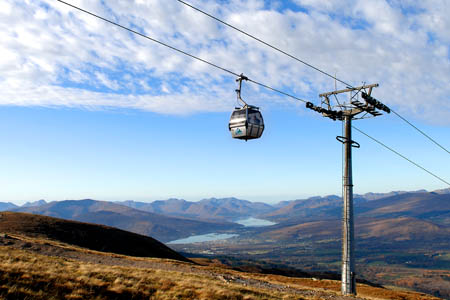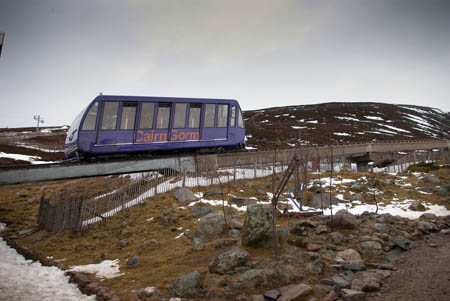
A gondola similar to this one on Aonach Mòr is one possiblity being put forward by Dave Morris. Photo: Andy Gray
A gondola system should be considered for Cairn Gorm as part of a review of access to the mountain, according to the head of the Ramblers in Scotland.
And tourists could be charged a ‘bed tax’ for staying in the area. Dave Morris made the suggestions after the announcement yesterday that guided walkers would, for the first time, be allowed to use the funicular train to the ski resort’s Ptarmigan station to access the summit.
Mr Morris, director of Ramblers Scotland, welcomed the move to permit small parties of walkers to exit the station for the first time, under a monitored pilot scheme. Previously, non-skiers were not allowed to leave the station and restaurant – a stipulation of the railway’s original consent aimed at protecting the Cairn Gorm summit from excessive visitor numbers.
Speaking after yesterday’s announcement, Mr Morris said: “We welcome the forthcoming introduction of guided walks along the path from the top of the funicular railway to the summit of Cairn Gorm.
“This will increase the opportunity for public enjoyment of the mountain without compromising the restrictions on general public access from the funicular. These restrictions are an essential feature of the planning consent for the funicular which were agreed by Highlands and Islands Enterprise when it promoted this development in the 1990s”.
However, he said the time was right for a complete review of access to the mountain. “Guided walks to the summit are just a small step in the right direction,” he said. “But we must now ask questions about access in general – fundamental to this is whether we should continue to drive up to 2,000 ft on Cairn Gorm.
“Lessons from other skiing areas, such as Aonach Mòr near Fort William and other European and North American resorts, suggest that it is far better, environmentally and economically, to park the car in the forest zone at the foot of the mountain.
“On Cairn Gorm, if new parking provision was made within the Glenmore Forest everyone could travel from there to the upper mountain slopes either by a shuttle bus service on the existing road, or by a new gondola system travelling through the forest.”
He said such a system would reduce the frustration of skiers, mountaineers and walkers who could not get to the mountain when snow blocked the access road, as happened on several occasions last winter when climbing and skiing conditions were at their best.
Mr Morris added: “In the rest of the year a shuttle bus or gondola system, linked into the funicular railway, would provide a fantastic introduction to the Cairngorms landscape as visitors journeyed from the heart of the Caledonian pine forest to the arctic wilderness of the plateau. And linked into a shuttle bus or gondola system would be new paths for walking and mountain biking that joined mountain and forest together into a fully integrated access framework.”
He called for a public consultation and urged the Cairngorms National Park Authority to take a lead. The key stakeholders, local and national, need to get round the table to devise a plan for the northern Cairngorms which is fit for the 21st Century.
“This must be one of the prime functions of the Cairngorms National Park Authority, with its remit for conservation, recreation and promoting sustainable development. If they cannot take the lead many will begin to wonder what extra benefit the national park is bringing to these world famous mountains.”
The Nevis Range resort on Aonach Mòr announced recently it had had its busiest June since it opened in 1989, with visitors to its new high-ropes adventure centre and the UCI Mountain Bike World Cup boosting numbers using its gondola system, the only one at a British ski resort.
A motorcycle trials championship also added to numbers, following the Lochaber centre’s most successful winter season since 2001.
Marian Austin, Nevis Range managing director, said: “We had an extremely busy winter and now we’ve had a terrific start to the summer. Two international events taking place have contributed to our figures, but even without these our visitor numbers are looking healthy.”
Ms Austin added: “We’ve been working hard to make our business sustainable on an all-year-round basis and to offer a wider variety of activities to our customers. Last year we opened a new cross country bike trail accessed by gondola, which is the only one of its kind in the UK. And this year we’re building a high ropes course, High Wire Adventure, which will be officially opened later this month.”
However, the Ramblers Scotland director Dave Morris was scathing about the past involvement of Highlands and Islands Enterprise, the development agency, in the development of facilities at Cairn Gorm, 80km (50 miles) north-east of Aonach Mòr. “Since their predecessor organisation, Highlands and Island Development Board, seized ownership of the upper slopes of Cairn Gorm from the Forestry Commission in 1971 there have been a series of disastrous HIDB-HIE inspired projects which have produced endless controversy and excessive expenditure of public money,” he said.
He called for a halt on any further expenditure, including a planned £4m to be spent by the agency on Cairn Gorm, until a comprehensive review of the whole project is carried out. Mr Morris also said the tourism providers should put back some money into the area, after benefiting from much of the public expenditure over the last decade.
He said: “Over the years the tourist industry of Badenoch and Strathspey has benefited enormously from the large sums of public money spent in the Cairngorms. Now is surely the time for the private sector to put some investment back into the mountains whose beauty and challenge underpin their whole industry.
“Perhaps it is time to talk about a ‘bed tax’, so that everyone who stays a night in a hotel, B&B or campsite can contribute a little extra, when paying their bill, to a fund which helps to promote sustainable development in the Cairngorms.”
